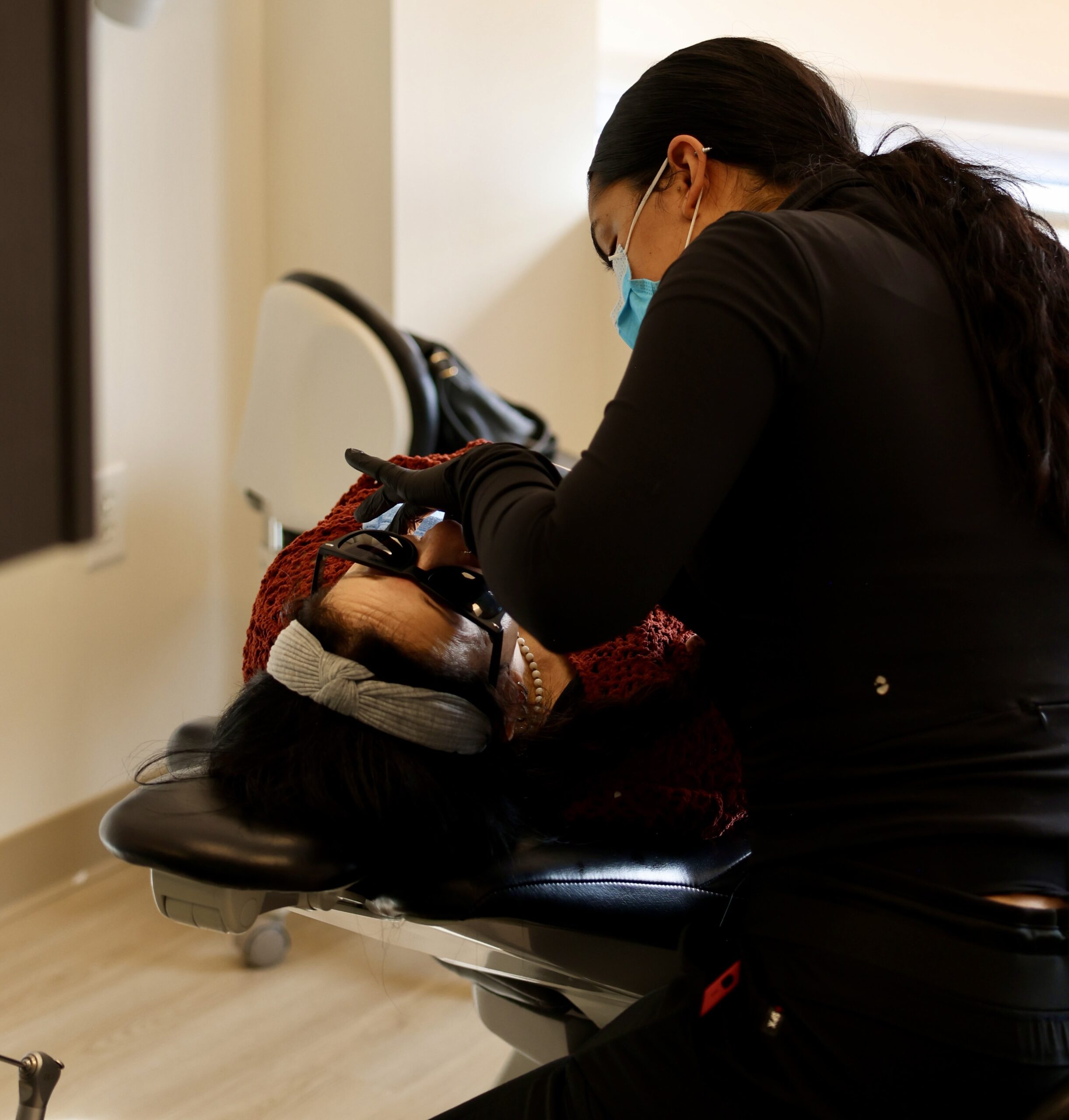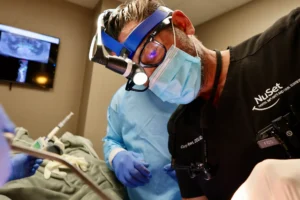Dental implants offer a reliable solution for missing teeth, but as with any surgery, infections can sometimes occur around them. Treating these infections promptly is crucial to prevent further complications and ensure the implant’s success. We love helping our patients have the most comfortable recovery possible.
At NuSet Dental Implants and Oral Surgery, we strive to prevent infections through meticulous procedures and aftercare. We understand the concerns you may have and are here to provide the best care possible.
Let’s discuss the signs and symptoms of dental implant infections, their causes, and effective treatments. Our goal is to help you protect your oral health and ensure your dental implants last a lifetime.
Signs and Symptoms of Dental Implant Infection
Identifying the early signs of an infection can help in getting prompt treatment. Here are the common symptoms to watch for:
- Inflamed gums around the implant site.
- Discomfort or pain near the implant.
- Signs of infection such as bleeding or discharge..
- Persistent bad breath or a strange taste.
- Movement or instability of the implant.
If you notice any of these symptoms, it’s important to contact your dentist immediately for an evaluation. Early detection can prevent more serious complications.
Diagnosing Dental Implant Infection
Accurate diagnosis is vital for effective treatment. Here’s how dental implant infections are diagnosed:
Dental examination
Your dentist will examine the implant site for signs of infection, such as redness, swelling, and discharge. They will also check for tenderness and pain.
X-rays and imaging
X-rays help your dentist see below the gum line. They can reveal bone loss around the implant, which is a sign of infection. Advanced imaging techniques like CT scans provide detailed views of the implant and surrounding structures.
Probing around the implant
Your dentist may use a periodontal probe to measure the depth of the pockets around the implant. Deep pockets can indicate an infection.
Medical history review
Your dentist will review your medical history to identify any conditions or medications that might contribute to the infection. Conditions like diabetes or habits like smoking can increase infection risk.
Early diagnosis is key to preventing more serious complications. If you suspect an infection, immediately contact your dentist for an evaluation. Prompt treatment can save the implant and protect your oral health.
Causes of Dental Implant Infection
Understanding what can lead to an infection helps in taking preventive measures. Here are some common causes:
- Poor oral hygiene leads to plaque and bacteria buildup around the implant.
- Alcohol and smoking restrict blood flow to the gums.
- Diabetes, autoimmune diseases, or conditions that affect the immune system can increase the risk of infection.
- Bacterial contamination during surgery.
- Improper implant placement.
- Individuals with weakened immune systems, either due to medical conditions or certain medications, are at higher risk for infections because their bodies cannot effectively fight off bacteria.
Treatment Options for Dental Implant Infection
Treating a dental implant infection promptly is crucial to avoid further complications. Here are the common treatment options:
Non-surgical treatments
Your dentist may prescribe antibiotics to fight the infection. These can help control the bacterial infection and reduce symptoms.
A dentist’s professional cleaning can remove plaque and bacteria from the implant site. This includes scaling and root planing to clean the areas around the implant thoroughly.
Using antimicrobial mouth rinses can help reduce bacteria in the mouth and support healing.
Surgical treatments
Debridement: This procedure involves surgically removing infected tissue around the implant. It helps eliminate bacteria and allows the area to heal.
Bone grafting: If the infection has caused bone loss around the implant, bone grafting may be necessary to rebuild the bone structure and support the implant.
Implant removal and replacement: In severe cases, the infected implant may need to be removed. After the infection has cleared and the area has healed, a new implant can be placed.
Early treatment is vital to prevent the spread of infection and preserve the implant. Contact your dentist immediately to discuss the best treatment option if you suspect an infection.
Prevention of Dental Implant Infection
Preventing infections around dental implants involves good oral hygiene and healthy habits. Here’s how you can reduce your risk:
- Maintain good oral hygiene.
- Visit your dentist regularly for check-ups and professional cleanings.
- Quit smoking. Smoking increases the risk of infection and slows healing.
- Eat a balanced diet rich in vitamins and minerals to support your immune system and promote healing.
- Adhere to all post-surgery care instructions provided by your dentist.
- Keep any existing health conditions, like diabetes, under control. This can help reduce your risk of infection.
Following these preventive measures, you can maintain the health of your dental implants and enjoy a confident, healthy smile. Consult NuSet for personalized advice and support if you have any concerns.
When to See a Dentist
Knowing when to seek professional help for a dental implant infection is important. Here are signs that you should contact your dentist:
- See your dentist if redness, swelling, pain, or bleeding around the implant does not improve with home care.
- If your symptoms worsen over time or you notice new symptoms such as pus discharge or a loose implant, seek immediate dental care.
- If you have a fever or feel unwell, it could indicate a spreading infection. Don’t wait to get medical attention.
Prompt treatment is crucial to prevent serious complications and protect your oral health. If you have any concerns, don’t hesitate to contact your dentist.
Schedule Your Dental Implant Consultation Today!
At NuSet Dental Implants and Oral Surgery, we prioritize your oral health and are committed to providing the highest quality care. Our dentists and oral surgeons ensure that your dental implant surgery is performed with precision, minimizing the risk of complications and infection.
Our experienced team is dedicated to making your implant experience as smooth and successful as possible. If you’re considering dental implants, schedule a consultation with us today. Let us help you achieve a healthy, confident smile with our expert care.
Frequently Asked Questions
Can an infected implant be saved?
Yes, an infected dental implant can often be saved if the infection is caught early and treated promptly. Treatment options include antibiotics, mechanical cleaning, and sometimes surgical intervention to remove infected tissue.
How can I tell if my dental implant is infected?
Signs of an infected dental implant include redness, swelling, pain, bleeding, discharge, bad breath, and a loose implant. If you notice any of these symptoms, contact your dentist immediately.
Can antibiotics cure implant infection?
Antibiotics can help control and reduce a dental implant infection but may not always cure it completely. In some cases, additional treatments like mechanical cleaning or surgery may be necessary to resolve the infection fully.





